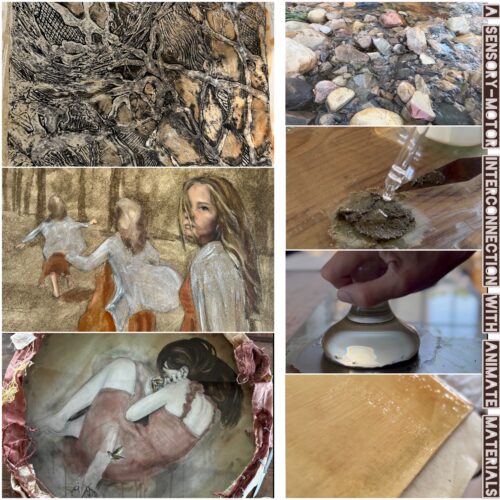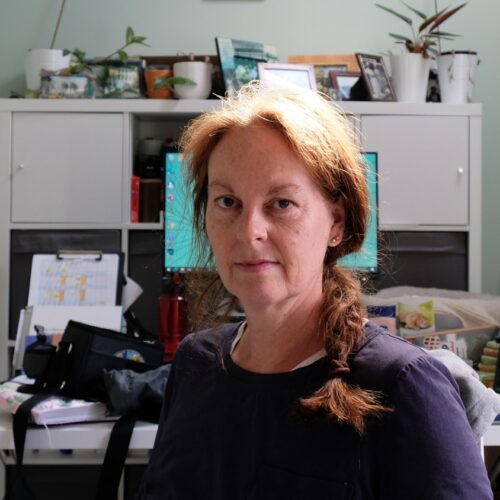
Degree or not Degree – that is the question
 Alongside the enormous flexibility to respond to the individual that is key to working with creative students, OCA tutors are required to adhere to an agreed process for ensuring that we provide essential parity at key points along your journey. One aspect of this is the pre written statement we are asked to select for students after assignments 2 and 4 which gives the student an indicator of how things are progressing with regards to development towards an assessed outcome.
Alongside the enormous flexibility to respond to the individual that is key to working with creative students, OCA tutors are required to adhere to an agreed process for ensuring that we provide essential parity at key points along your journey. One aspect of this is the pre written statement we are asked to select for students after assignments 2 and 4 which gives the student an indicator of how things are progressing with regards to development towards an assessed outcome.
In particular in this blog I would like to spend some time expanding on the third of these choices which says;
I use this statement very rarely, but have learned from experience that failing to notify a student when I feel that the gap is widening rather than closing only leads to much greater disappointment at assessment.
What I wanted to clarify here is what I feel this statement refers to, and more importantly what is does not refer to. If you are given this message, it most certainly does not mean that you are not an artist or can never be an artist. It also does not necessarily mean that you could not, in different circumstances, complete a degree in fine art.
For many students, what this statement really means is that now is not a good time to be attempting a degree. Other time commitments are impinging so heavily that the student simply hasn’t the time to commit to making the course work.
For students coming at an entry level, it is perfectly acceptable to receive low marks for level one courses. The marks don’t count against your final degree and your trajectory will simply be more vertiginous than those arriving with more experience. I have certainly witnessed people come from a low entry level to eventually achieving a first.
This statement however, suggests that there is something fundamentally missing from the way you are approaching your studies. You are probably the best person to say what that is – most students can immediately pinpoint what the problem is even if the solution seems more elusive.
After time, the next most common reason to be receiving this advice is that you may need to really face up to the idea that this is an actual degree, externally validated and with parity with other institutions. It requires an ambition to achieve and work for a degree and it requires a scholarly and critical approach.
It is important to remember that there is absolutely no need to have a degree in art in order to make art. For some students, the pressure and constraints of the degree are overwhelming and stressful. What this box is saying to those students is ‘ why don’t you think again about why you want to make art and what you want to learn, and consider whether in fact you might prefer to have one to one tuition from a professional artist on your own terms, without the need for assessment’.
One of my strongest level one painting students, having received a high mark for his level one course, decided to stop aiming for a degree and go for personal development instead. There is definitely a change of pace, but he is still focussed and driven to succeed at the goals he has set himself. Conversely, you may decide that working towards a degree provides a structure for ambitious learning that you could not achieve otherwise. Unfortunately I had to face a long time ago that I am more of a stick than a carrot person and without deadlines and regular prodding I slow to a standstill. Stranger still, I found when I did my post graduate degree that the degree gave me permission to be ambitious; to aim higher than I might have thought within my realm at home in my studio.
If you receive this advice from your tutor, have a think about why he or she might have been moved to give it. If it is not transparently clear in the subsequent report what you ought to do to get back on track, then ask. Remember as well that there are support staff at OCA, more than ever before, who are here to give more advice and talk things through. As the statement suggests, the work is reviewed again at Assignment 4 and you ought to be able to work with you tutor to close the gap. Even scraping a pass gets you onwards and upwards and gives you a chance to continue to improve your studentship.
Please don’t feel that being asked to consider personal development is a judgement about your ability to make art or be an artist – it is simply guidance that, for what might be any number of reasons, at this point in your life, with the way you are approaching this specific degree pathway something fundamental needs to change in order for you to grow creatively as effectively as possible.
(the image illustrating this blog is the front of a book by G. James Daichendt who writes about the relationship between art and education. For a more idiosyncratic and impassioned investigation try James Elkins – Why Art Cannot be Taught)






I’m really glad you’ve posted this, Emma – and I hope students will read it and feel you have clarified this process for them. Great post!
thank you Barbara – I hope so too.
This is such good advice Emma – thank you. I hope to study with the college, and if this should happen to me I will, with this kind of guidance, be in a much better place to resolve any difficulties.
It’s good to know that students are given that type of warning. It seems to me, as well, that that’s the kind of situation which could require a one-to-one meeting and I’m wondering if that’s available as well.
I’m sure some tutors do follow it up with a phone call or skype call Catherine, these things can be hard to discuss in writing. Lia is at HQ as well for support. (Lia Harness)
This blog provides a good explanation of what the single paragraph added to ones Tutor feedback does not say. I do not think that a tutor should underestimate just how harsh that paragraph may sound to somebody who is trying their hardest to work toward a degree. I would suggest that possibly adding the above blog explanation of some form of equivalent may help a lot.
I agree Doug, I would hope most tutors personalise it a bit or at least offer an explanation before and after – I certainly do.
Thank you Emma for an extremely helpful post. It is a shame that it will eventually disappear into blog history. Perhaps this could be placed on the OCA-student resourses somewhere, ‘Understanding Tutor Feedback’ maybe. I know many people struggle with that.
I like your avatar drawing starrybird. Without getting in to specifics for any one student or tutor, I’m interested to hear that many people struggle to understand what is being said to them in tutor reports. I know that tutors avoid jargon, but some words which might sound a bit unnatural have a really interesting provenance in terms of art theory or art history so researching to understand your feedback might well uncover ideas which are useful. Your feedback is personal to you and belongs to you – you paid for it! so it’s important to make sure you get the most from it – even if that means seeking clarification. I would say though, that part of learning is that ‘reach’ and it is a learning tool to speak to students using slightly unfamiliar words to encourage research and thinking in different ways. Feel free to suggest a subject for a future blog if there is a recurring theme. If it turns out to be Derrida we can always ask Bryan to write it!
Derrida? Hmmm… I’m not best placed to do that, but I do understand some of his concepts. I recommend watching the film ‘Derrida’ if anyone is interested.
Equally if one receives the statement that providing one applies oneself one is likely to pass that is precisely what it means, likely to achieve a pass mark or higher.
great article, i believe students should take on board the feedback but ask what they can do to make their work to the standard. i myself am in the first module of a creative writing degree, if i recieved these comments, i would be dissapointed but not give up. i would ask why and work on these factors.
Excellent article. I would want to know honestly at every stage is there are issues or problems. I don’t want to wait until the last minute and get a surprise. Sometimes honesty is a pathway to change or a new direction which is fine.
There is a lot in your piece that is food for thought and I’m sure lots of students will be heartened by. I have reviewed the book that is featured and when doing was struck again by disparity between some aspects of art and design education and that here in the UK. I’m making the point because it is worth noting that not being appropriate for an OCA degree at this time is not the same as not being able to work at degree level or on degree level activities elsewhere.Each institution has it’s own curriculum and its own way of measuring the achievements of its students. A visit to end of year degree shows is evidence that despite benchmarking there is a diversity of interpretations of the standards set out by the QAA. The point I’m making is that this statement refers to the projection against this specific degree and is not an absolute assessment of one’s potential for degree level education.
Hi,
Much appreciated. Where can overseas students view ‘end of year degree shows please?
Robin
My routine day: (1) get up between 8-11 am; (2) breakast; (3) dependent on (1), any combination of personal admin, heavy-ish reading and writing; (4) shower and dress; (5) lunch, preferably with Françoise; (6) afternoon in the studio; (7) usually back in the house in time for the PM Programme, with starts at 6pm here; (8) aperitif and dinner; (9) more heavy-ish reading; (9) to bed with a novel, currently re-working my way through the Austen oeuvre. This pattern is real-to-ideal in varying proportions and does not include weekends, walking, gardening and bone-idleness. The latter being a skill of which there is still much to learn: a work in progress. Paul
What an idiot I can be! Sorry everyone, I was so busy being funny at my own expense that I made this comment on the wrong post… I guess I never make it out of bed, really. Paul
we are pleased to have you visit Paul.
I found this interesting. Although I feel that allowances should be made for the fact that every student will work at a different pace. Some people naturally work faster than others. which may result in the slower workers feeling they should hurry up!
As I am progressing through coursework I become very involved in exercises and spend a lot of time on them,I certainly don’t want to rush for the sake of timescales , providing I bear in mind the time needed to study for a degree’.
Emma has made some very valid comments about the tutors reports, and her comments are very constructive.
I
This is a great post/resource. This statement can be a hard thing for a student to hear, but I always think of it as a way of managing expectations. Many students have been, or still are, part of local art groups and might well be used to positive affirmation from tutors and peers. That’s fine, but in an academic context there are different hurdles.
These hurdles are important. Drawing Level One might primarily be a course that improves your facility to draw by opening your eyes to things like use of negative space in respect to composition, tonal range, mark-making possibilities and so on, but students need to write about their experience. If the OCA were a ‘bricks and mortar’ art school you would have the chance to explain yourself to peers and staff in crit groups and so on. That’s how tutors know that you’re aware of what you’re learning.Studying at the OCA is different and the Learning Log serves part of that purpose. With the advent of Skype feedback, with ‘minuets’ rather than full-on narrative reports, we can get close to the ‘bricks and mortar’ tutorial, which helps the feedback become more conversational, smoothing out some of the bluntness that inevitable in the written reports.